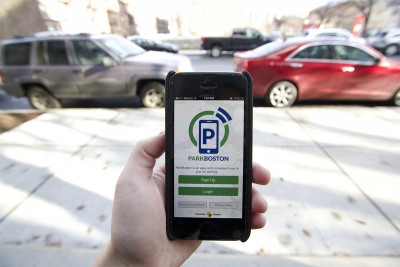During his first State of the City address Jan. 13, Boston Mayor Martin Walsh introduced ParkBoston, an app which the City hopes will simplify parking at meters.

“This system is an app that will allow drivers in Boston to pay for their parking spots through their phones,” said Kris Carter from the Mayor’s Office of New Urban Mechanics. “You download it, put in your license plate number and pay for time with your credit card.”
Development for the app began June 2014, and the system was launched Jan. 13, said Gina Fiandaca, who was named commissioner of the Boston Transportation Department on Sunday.
Currently, the app is only available for 400 metered parking spots in the Back Bay neighborhood, but the City hopes to bring the service to all 8,000 metered parking spaces in Boston by the end of 2015, said Tracey Ganiatsos, public information manager for the Boston Transportation Department.
“So far, our pilot period in the Back Bay has been successful. People can pay with coins or with their smartphones,” Ganiatsos said. “We want to make parking more convenient in the city.”
ParkBoston is part of a larger initiative by Walsh to implement technology throughout the city, Carter said.
“Broadly, Mayor Walsh’s plan to put technological resources to use around the city involves more than ParkBoston,” he said. “Many other departments are looking into the possibility of relying on technological advances to make things better for the city. Using technology puts users directly in touch with the government, letting citizens report things more quickly and getting things to run more efficiently.”
Passport Parking, Inc., a company specializing in creating cloud-based parking systems for cities, worked with the mayor’s office to develop the app, which uses a zone number and license plate to allow parking enforcement officers to check whether or not a car has paid. Patrons can check how much time they have remaining at a meter and purchase additional time through the app, according to a Wednesday press release.
“We’re really hoping to improve the parking experience for citizens of Boston,” Fiandaca said. “Everyone can identify with the issue of getting a parking space and finding the exact change to pay for it. We had tested out several similar apps in small areas of Boston and decided to implement our own system to make parking easier.”
In addition to convenience for consumers and parking enforcement officials, ParkBoston collects research data for the city, Carter said.
“ParkBoston will let us see how the city operates, how convenient [the app] is, understand where people are using it, how often they’re using it, and what the length of time they’re using it for is, all making for an easier collection of data,” Carter said. “All of that is more difficult to gauge with a metered parking program.”
The app also collects revenue through a 15-cent charge each time the app is used. The app itself, however, comes at no charge to the city, Fiandaca said.
Several residents said the app may be convenient, but it could cause new parking problems to arise.
Jared Poulsen, 34, of Brighton, said for the app to be successful, the benefits must outweigh the consumer cost.
“I definitely think it will help, because it’s always nice to be able to feed your meter and not worry about it running out,” he said. “I think most people in Boston will be happy about it.”
Jeremy Sherman , 26, of Brighton, said people are more likely to keep their cars in one spot all day with the ease of the app, making parking spots harder to find.
“The good thing is that it will be easier,” he said. “The bad thing is if people stick around all day and continue to refresh the meter, there would have to be a maximum amount of time like normal meters, but maybe a bit longer.”
Dionne Harris, 45, of Dorchester, said revenue seems to be the primary motivation for the city in creating a parking app.
“They’ll probably get more money,” Harris said, “but I don’t know if it will change the parking situation.”


















































































































